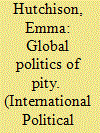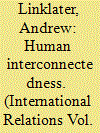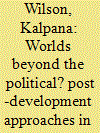| Srl | Item |
| 1 |
ID:
130984


|
|
|
|
|
| Publication |
2014.
|
| Summary/Abstract |
The study of emotion has become a steadily growing field in humanitarian actions. This essay adds to the field through a further empirical examination of the political roles emotions can play. Specifically, the essay questions how emotions were implicated in the construction of transnational solidarity-and the associated humanitarian actions-following an event of pivotal global importance: the Asian tsunami disaster of December 2004. To this end, I focus on the emotional dimensions of dominant media tsunami imagery and examine how emotions helped to produce the humanitarian meanings and ideologies on which the subsequent solidarity and humanitarian actions were based. Analyzing photographs in the New York Times, the essay demonstrates that the dominant tsunami imagery helped to evoke solidarity and garner aid. It did so, at least in part, through mobilizing stereotypical and deeply colonial representations of developing world disaster that are suggestive of a "politics of pity." In this way, the essay contributes both an empirical study of emotions in world politics and an examination of the linkages between emotions and contemporary humanitarianism.
|
|
|
|
|
|
|
|
|
|
|
|
|
|
|
|
| 2 |
ID:
092042


|
|
|
|
|
| Publication |
2009.
|
| Summary/Abstract |
Kenneth Waltz's structural realism abstracts the international political domain from other spheres of social interaction to explain recurrent patterns of competition and conflict across the millennia. There are similarities between the structural realist 'grand narrative' and the process-sociological approach developed by Norbert Elias. But the latter supported 'high-level synthesis' in the social sciences in order to understand how relations between material, ideational and emotional forces have contributed to the growth of human interconnectedness. The analysis contended that one of the purposes of the social sciences is to increase knowledge of how humans can gain control of the processes that bind them together in global networks of interdependence. Elias was opposed to partisan inquiry such as Kant's notion of a universal history with a cosmopolitan intent. But a shared emphasis on how humans have developed the capacity to cause distant harm reveals how future grand narratives can combine the analysis of the growth of interconnectedness with the ethical argument for greater transnational solidarity.
|
|
|
|
|
|
|
|
|
|
|
|
|
|
|
|
| 3 |
ID:
148261


|
|
|
|
|
| Summary/Abstract |
In his 1966 essay ‘A Report from Occupied Territory’, James Baldwin wrote that ‘occupied territory is occupied territory, even though it be found in that New World which the Europeans conquered’. Though written 50 years ago, Baldwin’s observations continue to resonate, indicating historical trends across geographical experiences affected by the legacy of colonialism. A growing theme in development and peace building studies relates to a kind of boundary crossing that sees academics and activists drawing linkages across spatial and temporal divides. The situation in Palestine–Israel has taken an increasingly central role in mobilising transnational solidarities that cross such boundaries. By examining James Baldwin’s analysis of Harlem’s ‘occupation’ – as well as drawing from a range of voices such as Achille Mbembe, Frantz Fanon, Edward Said, Toni Morrison and Laleh Khalili – this paper will explore the shared experiences of racism, colonialism, military occupation and dispossession that separate and divide, and the possibilities for transnational solidarities that defy those separations.
|
|
|
|
|
|
|
|
|
|
|
|
|
|
|
|
| 4 |
ID:
156652


|
|
|
|
|
| Summary/Abstract |
This article considers some ways in which one strand of post-development thinking has influenced non-governmental organisation (NGO)-led activist discourses and practices of transnational solidarity. It argues that there has been a tendency for these discourses and practices to rearticulate racialised constructions of unspoiled and authentic ‘natives’ requiring protection which are historically embedded in colonial practices of governance. In turn, this has meant the failure to acknowledge indigenous histories of political organisation and resistance. Further, the characterisation of development in binary terms as both homogeneous and always undesirable has meant the delegitimisation of demands for equality as well as the neglect of the implications of the decisive shift from developmentalism to neoliberal globalisation as the dominant paradigm. Drawing upon a discussion of aspects of the local, national and transnational campaign to prevent proposed bauxite mining in the Niyamgiri hills in Odisha (India), I argue that given that international NGOs are themselves embedded in the architecture of neoliberal development and aid, their campaigning activities can be understood as facilitating the displacement and marginalisation of local activists and silencing their complex engagements with ideas of development. This potentially defuses and depoliticises opposition to neoliberal forms of development, while transposing collective agency onto undifferentiated publics in the Global North, processes which, however, continue to be actively resisted.
|
|
|
|
|
|
|
|
|
|
|
|
|
|
|
|